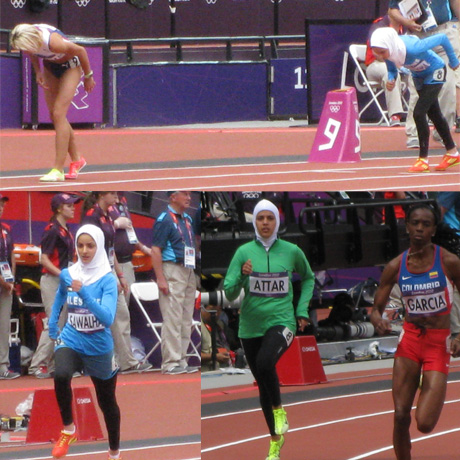This is a guest post by an Olympics spectator
Yesterday a young woman representing Saudi Arabia had the privilege of jogging two laps of the track at the Olympic stadium. A packed crowd of (mostly) paying spectators generously applauded her effort. At the same time seven elite female athletes competed for a place in the semi-finals of the women’s 800 metres at the London 2012 Olympics.
Attar finished in a time of 2:44.95; the winner (Janeth Jepkosgei Busienei of Kenya), in 2:01.04. The gap between first and last was 43.91 seconds – just 7 hundredths of a second less than the time it took Kirani James of Grenada to win the men’s 400 metres final on Monday. Attar’s performance was so poor that her participation was obviously about politics rather than sporting excellence. Hardly a first for the Olympics.
According to press reports Attar is aged 19. She was born in California of a Saudi Arabian father, and holds dual American and Saudi citizenship. Attar is therefore not a typical young Saudi woman. Indeed, she appears to have spent most of her life living in California. Currently she attends Pepperdine University, where she studies art. The annual fees at Pepperdine are estimated at $54,696. Unless she receives financial aid, this suggests her parents must be quite wealthy and possibly rich.
In her post-race interview conducted in fluent, American accented English, a smiling Attar came across as a likeable, intelligent young woman. She was also clear about her reasons for running: it was about representing ‘the women’, and ‘hopefully making a difference over there’. Or as a BBC commentator put it: ‘a step forward for women’s athletics’.
So are we seeing the seeds of liberalisation, or was this a stunt?

Viewed from one angle this could be seen as one of several slow but necessary steps towards achieving much-needed equal rights for women in Saudi Arabia. And what better choice than Attar; someone brought up in the West who won’t be returning to Saudi after the Olympics; someone who won’t have to face any abuse that might come her way for taking part.
Alternatively, this could be seen as gesture politics, as the Saudi Arabian government making token gestures to their liberal critics while getting on with business as usual behind the scenes. And what better choice than the unwitting Attar; an articulate, friendly, photogenic person; someone who hasn’t gone to school in Saudi; someone who hasn’t shared the same experiences as the majority of Saudi women her age.
On this darker, cynical reading gullible Westerners are being conned by a relatively risk-free PR stunt that taps into the myth of a supposed ‘Olympic spirit’ where taking part is as important – if not more so – than winning.
I’d like to hope this is progress. But you can never tell.
Finally, Sarah Attar’s story has also had an unintended consequence. Her participation at the Olympics overshadowed that of Woroud Sawalha. Representing Palestine, Sawalha finished in a slightly more respectable – though still uncompetitive time – of 2:29.16.